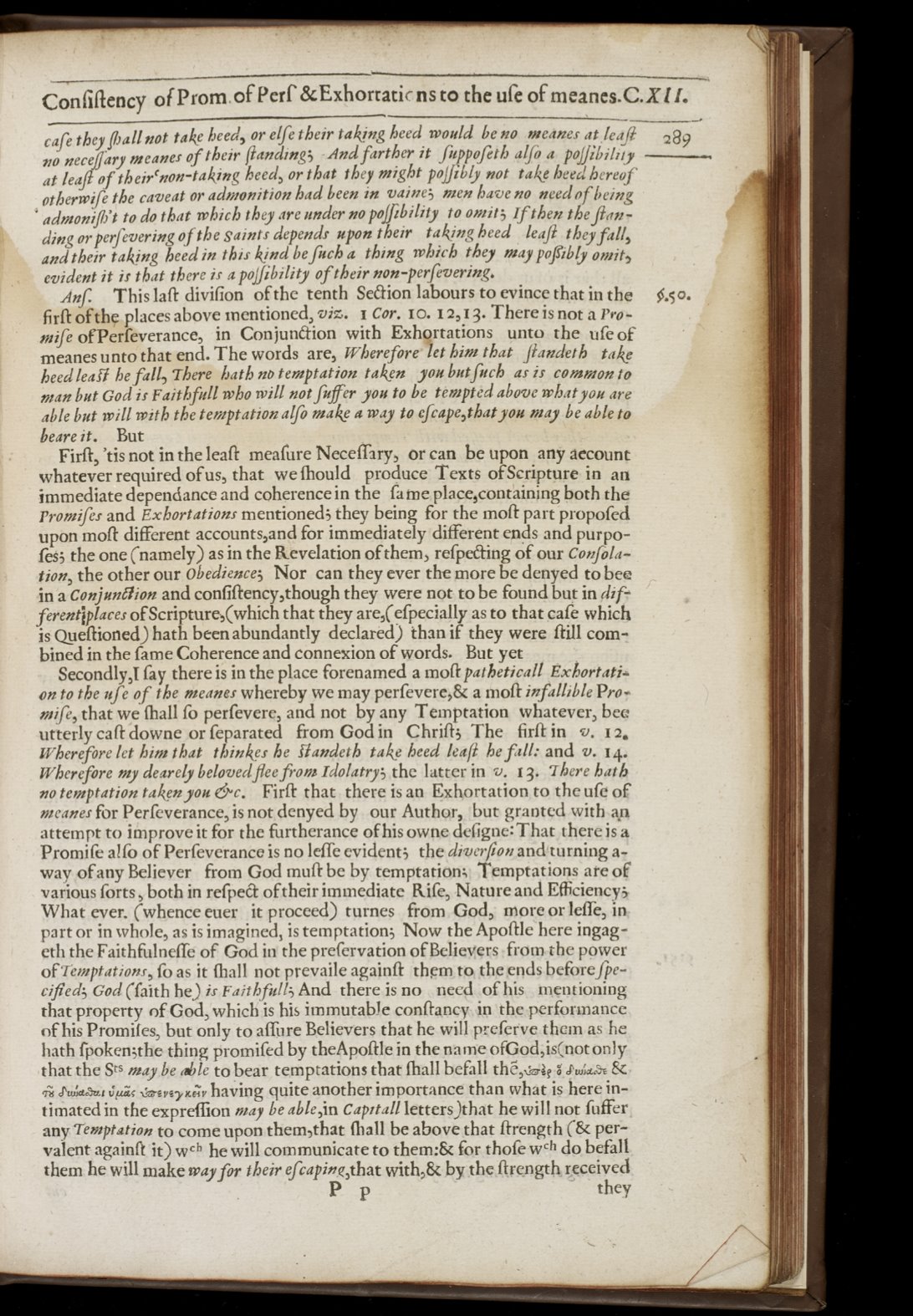

Confi(lency
of
Prom.of Perf
&Exhortatic
ns
to
the
ufe
of
ineanes.C.XU.
cafe they
fball
not
take heed, or elfe
their taking
heed
would
be
no
meaner
at
leaf
289
no
necefary meaner
of
their [landing;
-And
farther
it
fuppofeth älfo
a
poffibility
at
leaf[
of
their`non-
taking
heed, or
that
they
might
poffìbly
not take
heed
hereof
otherwife
the caveat
or
admonition
had
been
in vaine;
men have
no
need
of
being
admonifb't
to
do
that
which
they
are under
no
pofïbility
to
omit;
If
then the
flan-
ding orperfevering
of
the Saints
depends
upon
their taking
heed
leafy
they
fall,
and their taking
heed
in this kind
be
fach
a
thing
which
they may
poffibly
omit,
evident
it
is
that
there is
a pofibility
of
their
non
perfevering.
Anf.
This
[aft
diviuion
of
the
tenth
Seítion
labours
to
evince
that
in
the
4.5o.
firft
of
the
places
above mentioned,
viz.
1
cor.
io.
12,13.
There
is
not
a pro
-
mifeofPerfeverance,
in
Conjun
&ion
with Exhortations
unto
the
ufe
of
meaner
unto
that
end.
The
words
are,
Wherefore
let him
that flandeth
take
heed
leaf/
he
fall,
There
bath
no
temptation taken
you but
fuch
as is
common to
man but
God
it
Faithfull
who
will
not
fuffer
you
to be
tempted
above
what
you are
able but
will with
the
temptation alto
make
a
way to
efcape,thatyou
may
be
able to
beare
it.
But
Firft,'tis
not
in
the
leaft meafure
Neceffary,
or
can
be
upon
any
account
whatever required
ofus, that wefhould
produce
Texts
ofScripture
in
an
immediate dependanceand
coherence in
the fame
place,contáimng both
the
Promifes
and
Exhortations
mentioned;
they being for the moft part
propofed
upon moft different accounts,and for immediately different ends and
purpo-
fes;
the one (namely)
as
in
the Revelation
of
them,
refpeâing
of
our
Confola-
tion,
the other our
obedience;
Nor
can
they
ever
the morebe
denyed
tobee
in a Conjunílion
and confiftency,thoughthey were not
to
be foundbut
in
clip,
ferentIplaces
ofScripture,(which
that
they are,(efpecially
as
to that
çafe which
is
Queftioned)
bath
been abundantly declared)
than
if
they were
ftill
com-
bined
in
the
fame Coherence and connexion
of
words.
But
yet
Secondly,[
fay
there
is
in
the
place
forenamed
a
moft patheticall
Exhortati,
onto
the
ufe
of
the meaner
whereby
we may
perfevere,&
a
molt
infallible Pro»
mife,
that
we
(hall fo
perfevere, and not by
any
Temptation
whatever, bee
utterly
caft
downe or feparated from God
in
Chrift; The
firft in v. 12.
Wherefore
let
him
that
thinker
he
flandeth take
heed
leall
he
fall:
and
v.
14.
Wherefore
my
dearely beloved
fee
from
Idolatry;
the
latter
in v. 13. There
bath
no
temptation taken
you
&c.
Firft
that
there
is
an
Exhortation
to
the
ufe
of
meaner
for Perfeverance,
is
not.denyed
by
our Author,
but granted
with
an
attempt
to
improve it for the furtherance
of
his
owne
defigne:That there
is
a
PromiCe
alfo
of
Perfeverance
is
no
leffe
evident; the
divert
on
andturning
a-
way
ofany
Believer from
God mutt be
by
temptation; Temptations are
of
various
forts, both
in
refpe&
oftheìr
immediate Rife,
Nature
and
Efficiency;
What
ever.
(whence euer it proceed) turnes from God, more or
leffe, in
part or
in
whole,
as is
imagined,
is
temptation; Now the
Apoftle-here
ingag-
eth the
Faithfulneffe
of
God
in
the prefervation
of
Believers
from
the
power
of
'temptations, fo
as
it fhall
not prevaile
againft them
to
the ends
beforeJ'pe-
cifaed; God
(faith he)
is
Faithfull; And there
is
no
need
of
his
mentioning
that
property
of
God,
which
is
his
immutable
conftancy
in
the performance
of
his
Promifes,
but
only
to
afftne
Believers
that
he will
preferve them
as
he
hath fpoken;the thing promifed by theApoftle
in
the name ofGod,is(notonly
that
the
Sts
may
be
:able
tobear
temptations that
(hall
befall
the,
ßáQ
o
aaasg
Sc,
d`.,4,e4
4
veye
v
having quite another importance
than
what
is
here in-
timated
in
the expreflion
may be
able,in
Caprtall
letters)that
he will
not
fuffer,
any
Temptation
to
come upon
them,that
[hall
be above
that
ftrength
(8e
per-
valent
againft
it)
wdh
he
will
communicate
to
them:&
for thofe
wch
do
befall
them he
will
make
way
for
their
efcapin,¢,that
with,& by
the
ftrength, received
P
p
they










